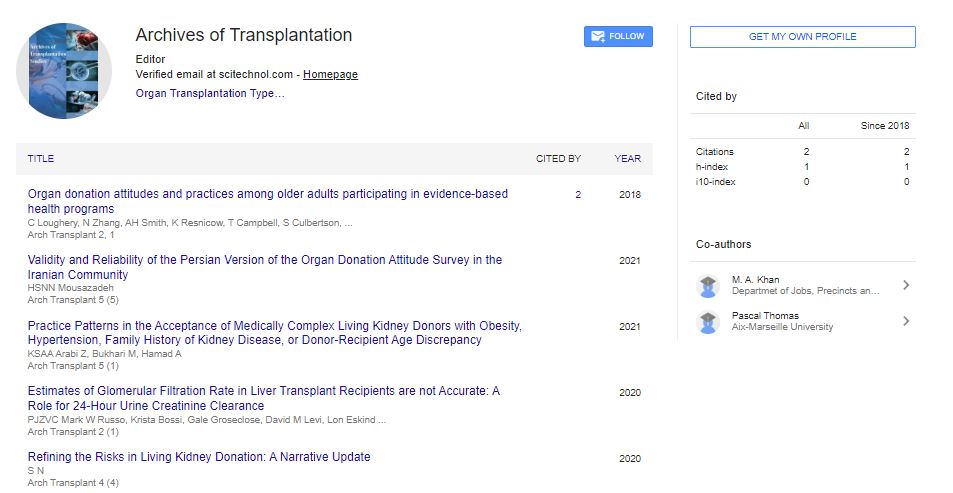Research Article, Arch Transplant Vol: 4 Issue: 5
De Novo Persistent Post-Lung Transplantation HLA Donor-Specific Antibodies (DSA) but not Preformed DSA are Associated with Worse Survival and a Higher Risk of Developing Chronic Lung Allograft Dysfunction
Christophe Picard1,2*, Agnès Basire1, Anderson Loundou3, Matthieu Pelardy1, Jacques Chiaroni2, Pascal Thomas4, Carine Gomez5 and Martine Reynaud-Gaubert5
1Immunogenetic laboratory, Établissement Français du Sang Alpes Méditerranée, 13005, Marseille, France
2UMR 7268 ADÉS Aix-Marseille Université /EFS /CNRS, Marseille, France
3Department of Public Health -EA 3279 Research Unit, University Hospital Marseille, Aix-Marseille University, France
4Service de Chirurgie Thoracique et Transplantation Pulmonaire, CHU Nord Faculté de Médecine, Aix Marseille Université, France
5Service de Pneumologie et Transplantation Pulmonaire, CHU Nord Faculté de Médecine, Aix Marseille Université, France
*Corresponding Author : Christophe Picard
UMR 7268 ADÉS Aix-Marseille University /EFS /CNRS, France
Tel: +33 4 91 18 93 62
E-mail: christophe.picard@efs.sante.fr
Received: January 18, 2018 Accepted: Februaury 07, 2018 Published: Februaury 13, 2018
Citation: Picard C, Basire A, Loundou A, Pelardy M, Chiaroni J (2017) De Novo Persistent Post-Lung Transplantation HLA Donor-Specific Antibodies (DSA) but not Preformed DSA are Associated with Worse Survival and a Higher Risk of Developing Chronic Lung Allograft Dysfunction. Arch Transplant 2:1.
Abstract
Background: The introduction of highly sensitive solid-phase immunoassay technology permitted better detection and characterization of donor-specific HLA antibodies (DSA) in pre- and post-transplant period; however their impact on clinical outcome after lung transplantation (LTx) remains controversial. Patients and methods: A retrospective analysis on a cohort of 138 adult recipients who had undergone LTx at the Marseille Lung Transplant Centre (France) between 1998 and 2010 was performed. Detection at Day 0, Month 1, Month 3,Month 12 and Month 24 post- LTx of HLA antibodies (Abs) and DSA was investigated using a Luminex assay. Results: Pre-LTx DSA (n=15) were not correlated to overall survival and development of CLAD. De novo DSA were frequently detected (41% of cases), appeared earlier in the post-LTx period (80% in the first month), and were mostly directed against HLA class II antigens (78% of DSA) and against putative non classical HLA antigens such as HLA-Cw and –DQA (57% of DSA). De novo post-LTx DSA detected at M3 and/or M12 significantly affected survival (p<0.001 and p=0.03, respectively) and de novo persistent DSA from M1 to M3 (16% of cohort) were associated with CLAD (p=0.02). Cox proportional hazard regression modeling, showed a worse prognosis in recipients who have persistent de novo class II DSA (OR = 2.8, 95% CI 1.2 to 6.7, p = 0.02). Conclusion: Our results highlight that more than one-third of recipients developed de novo DSA during the first year post-LTx and that their persistence overtime seems to be associated with a worse prognosis regarding graft function and survival.
 Spanish
Spanish  Chinese
Chinese  Russian
Russian  German
German  French
French  Japanese
Japanese  Portuguese
Portuguese  Hindi
Hindi 